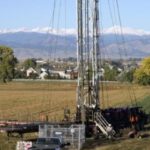On March 7, 2018, an important bill that would likely change how oil and gas operations are permitted and regulated in the state has made it through the Colorado House and is headed to the Senate.
The bill, the HB18-1071, Regulate Oil Gas Operations Protect Public Safety, barely passed through the House with opposition on both sides of the aisle, according to a report by Colorado Alliance of Mineral and Royalty Owners.
The Senate will be hearing this bill in the Senate Agriculture, Natural Resources & Energy Committee upon adjournment in room 357 on March 7, 2018.
The bill, if it makes it through the Colorado Senate and is signed into law as written, codifies the Colorado Appeals Court decision in the Martinez v. COGCC case.
In short, that court ruling said the COGCC didn’t give balance to fostering safe oil and gas development and protecting health, safety and environment and wildlife, and the court said the COGCC had to change its procedures regarding oil and gas permitting in order to do so.
The intent of the bill that passed the House and is heading to the Senate committee is to place the appeals court finding into Colorado code.
The outcome of the Martinez case was taken to the Colorado Supreme Court by the COGCC. The high court agreed to hear the case in 2018.
Text of the bill in question is reproduced below:
A BILL FOR AN ACT CONCERNING THE REGULATION OF OIL AND GAS OPERATIONS IN A MANNER CONSISTENT WITH THE PROTECTION OF PUBLIC SAFETY.
[The Colorado HOUSE 3rd Reading Unamended – February 9, 2018 HOUSE 2nd Reading Unamended]
Current law declares that it is in the public interest to “[f]oster the responsible, balanced development, production, and utilization of the natural resources of oil and gas in the state of Colorado in a manner consistent with protection of public health, safety, and welfare, including protection of the environment and wildlife resources”.
The Colorado court of appeals, in Martinez v. Colo. Oil & Gas Conservation Comm’n, 2017 COA 37, has construed this language to mean that oil and gas development is not balanced with the protection of public health, safety, and welfare, including protection of the environment and wildlife resources. Rather, that development must occur in a manner consistent with such protection.
The bill codifies the result reached in Martinez.
Be it enacted by the General Assembly of the State of Colorado:
SECTION 1. In Colorado Revised Statutes, 34-60-102, amend 3 (1)(a)(I) as follows: 4 34-60-102. Legislative declaration. (1) (a) It is declared to be in the public interest to: (I) REGULATE the responsible, balanced development, production, and utilization of the natural resources of oil and gas in the state of Colorado in a manner consistent with protection of public health, safety, and welfare, including protection of the environment and wildlife resources.
AS SPECIFIED IN SECTION 34-60-104.7, THE BALANCED DEVELOPMENT OF OIL AND GAS RESOURCES MUST BE IMPLEMENTED IN A MANNER CONSISTENT WITH SUCH PROTECTION.
SECTION 2. In Colorado Revised Statutes, add 34-60-104.7 as follows:
34-60-104.7.
Duties of commission – protection of environment, health, and climate. IN EXERCISING THE POWERS CONFERRED ON IT UNDER THIS ARTICLE 60 AND IN ADMINISTERING AND ENFORCING THIS ARTICLE 60, THE COMMISSION SHALL REGULATE OIL AND GAS OPERATIONS SO AS TO PREVENT AND MITIGATE SIGNIFICANT ADVERSE ENVIRONMENTAL IMPACTS ON ANY AIR, WATER, SOIL, OR BIOLOGICAL RESOURCE RESULTING FROM OIL AND GAS OPERATIONS TO THE EXTENT NECESSARY TO PROTECT PUBLIC HEALTH, SAFETY, AND WELFARE, INCLUDING PROTECTION OF THE ENVIRONMENT AND WILDLIFE RESOURCES.
SECTION 3. Applicability. This act applies to conduct occurring on or after the effective date of this act.
SECTION 4. Safety clause. The general assembly hereby finds, determines, and declares that this act is necessary for the immediate preservation of the public peace, health, and safety.
[Reengrossed version of this bill is available at http://leg.colorado.gov.]







